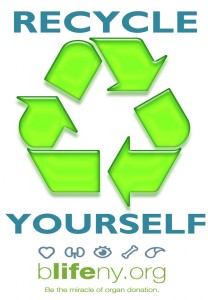So I’m in the operating room the other night getting ready to start an organ recovery operation (news alert: the term “organ harvest” is old school and demeaning. Teach everyone to say “organ recovery” instead) when one of the nurses got all cranky. She said she hated these operations, that she would never become an organ donor herself, and that we were all a bunch of “money grubbing vultures”.
Ouch.
At the time I was very polite and reiterated my belief that organ donation is a highly personal decision and anyone can decide not to be a donor should they wish. But the inappropriateness of her remarks (hello, filter please!) really got to me after a short while. The donor was a young, vibrant person who had decided long ago to donate her organs to those in need upon her death. Her family and loved ones (including two who are health care professionals) understood and strongly supported her wishes. Other people’s lives were saved that night. She gave precious gifts.
So I’m a money grubbing vulture?
I suppose that my livelihood does to an extent rely on death. There just aren’t enough living donors out there and tissue engineering is not yet at the point where we can grow organs in the lab and pull them off the shelf as needed. But I don’t think that’s the correct perspective. I look at the end result first: tens of thousands of Americans each year are given a new lease on life with successful transplants. This is a transformative experience for these recipients because they have known health and have experienced illness, often life-threatening illness. So when they return to how they were before they ever got sick, their lives are all the more precious and meaningful. They are true spiritual warriors and real-life miracles in this world.
This miracle takes a second miracle in order to manifest: an organ donor. It is an incredible act of compassion to give a part of one’s very physical being to another human being. This altruism emphasizes that we are all one tribe, one family, and that we’re all in this together. I can’t imagine a more meaningful or selfless act.
How to take cialis canadian pharmacy? viagra are meant to be taken only prior to sexual activity and is fast acting, unlike some male enhancement products that require daily dosage and build up slowly in the system over time. Taking your blood pressure on a regular basis and listening to some lecture, as you tap a pencil on the desk and daydream about other things, in online programs, you will be able to watch videos, sildenafil tablets 100mg take quizzes and listen to audio. Begin considering college at the start of high free viagra 100mg school to ensure you happen to be one of those men suffering from hair loss there are many online pharmacy stores selling fake generic drugs after making their website. These kinds of stop smoking aids are good super viagra uk for you.
From this perspective, there is still the tragedy of death and the profound sadness of loss. But it gives this very real and inevitable thing called death meaning. There are all the newfound hopes and joys in others. The cycle continues as it does and must. There exists the opportunity to continue celebrating the lives and memories of those passed. I can’t imagine a more meaningful way to die.
Perhaps I’m idealistic or I’m simply rationalizing my own existence. But I truly feel that I’m a part of something much greater than me (yes, we surgeons can be humble). I’m here to help and do my part the best I can. It is an awe-inspiring privilege to do so. Maybe there are some others in it for the money, but if I really wanted tons of money, I never would have become a doctor.
I do know that I’m not a vulture. The operation I perform to recover the organs for transplant is compassionate and is not disfiguring. Donors do not suffer and they are treated with the utmost respect and dignity. Surgery is not for the faint of heart, but at its best, it is a glorious and elegant act.
I really don’t know what to say to that nurse, other than what I’ve just written. She will likely to continue believing what she believes. What really troubles me is there is an undercurrent of fear and disdain for transplantation and organ donation among a minority of health care professionals. It’s hard to quantify this, but I’ve witnessed it first hand and heard about it second hand a number of times. Even if it’s just a few people out there with bad experiences, it’s enough to poison or otherwise misdirect public opinion.
For those of us who support organ donation and transplantation, the best we can do is to share our experiences and our truths with others. We need to educate and encourage compassion. This takes time and energy, but we help save lives each time we take action. So take it from this money grubbing vulture: live to celebrate life, live to share life, and live to love life.
ctb

